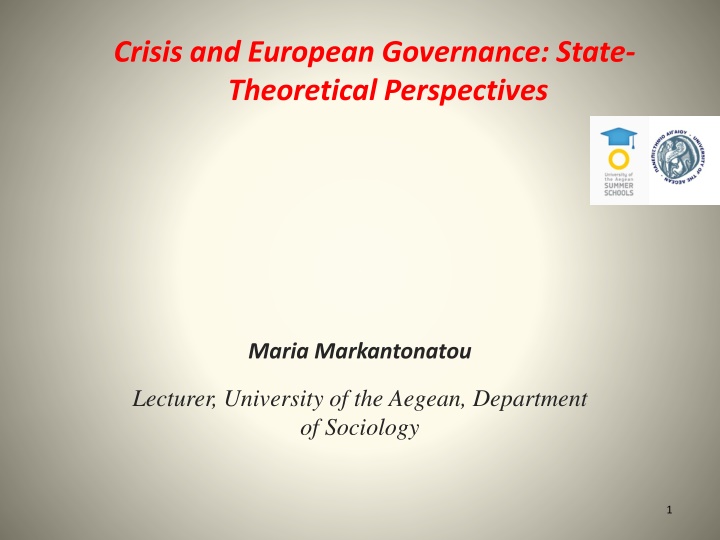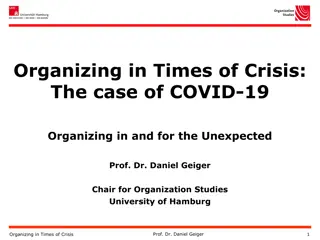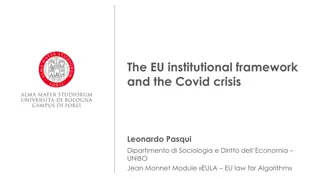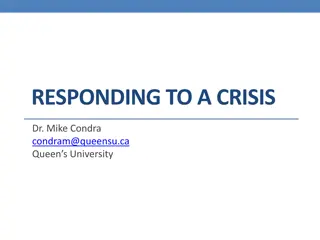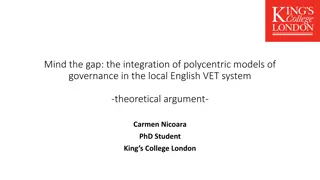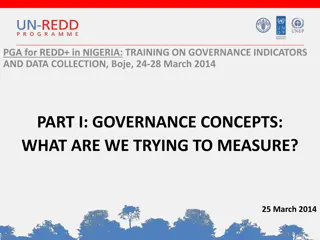Crisis and European Governance: State-Theoretical Perspectives
Maria Markantonatou, a lecturer at the University of the Aegean, delves into the implications of the crisis on European governance from state-theoretical perspectives.
Download Presentation

Please find below an Image/Link to download the presentation.
The content on the website is provided AS IS for your information and personal use only. It may not be sold, licensed, or shared on other websites without obtaining consent from the author.If you encounter any issues during the download, it is possible that the publisher has removed the file from their server.
You are allowed to download the files provided on this website for personal or commercial use, subject to the condition that they are used lawfully. All files are the property of their respective owners.
The content on the website is provided AS IS for your information and personal use only. It may not be sold, licensed, or shared on other websites without obtaining consent from the author.
E N D
Presentation Transcript
Crisis and European Governance: State- Theoretical Perspectives Maria Markantonatou Lecturer, University of the Aegean, Department of Sociology 1
How did we get to the 2008 Crisis? Considered as the worst financial crisis since that of the 1930s Its origins are to be found in the 1970s crisis What served as a solution to resolve the 1970s crisis, has been a cause for the 2008 crisis financialization What kind of social and economic regulation prevailed after World War II? From postwar golden years to the 1970s crisis to financialization to the 2008 crisis 2
Streecks periodization of democratic capitalism from the postwar years to the crisis Democratic Capitalism: a political economy ruled by two conflicting principles, or regimes, of resource allocation: one revealed as merit by a free play of market forces , and the other ( ) certified by the collective choices of democratic politics (Streeck 2011). The crystallization of a conflictual correlation of social forces, formed by the historically embedded within liberal capitalism contradiction between formal/legal equality on the one hand, and the entrepreneurial freedom/class society, on the other. 3
Crises of postwar democratic capitalism four phases (following Streeck s model): 1) from the Keynesian regulation to the inflation crisis of the 1970s 2) through the increase in public debt during the 1980s 3) to the enhanced private indebtedness of the 1990s 4) to the 2008 crisis and the bail out of banks 4
Postwar period: age of prosperity in all developed countries based on a Keynesian economic model and a strong welfare state. Keynesianism promoting state intervention and state protectionism in order to secure domestic demand high growth rates, a class compromise between industrialists and workers. End of the 1960s: declining growth rates, fall of profits, oil crisis in 1973, inflation end of the postwar prosperity Governments: facing the challenge of securing full employment together with pressures from trade unions asking for wage increases in the framework of free collective bargaining. 5
The first phase: Governments had to cope with unions that demanded full employment and collective bargaining and with capitalists interested in protecting their profits inflation-tolerant policies during the 1970s The second phase: Instability caused by inflation and falling profits period of high capital mobility and volatility. Firms looking for better investment opportunities abroad new wave for global trade. Governments: high rates of unemployment revenue shortfall less funding for the welfare state increasing public debt since the 1980s. But, as dependence on borrowing was increasing, creditors started to demand more fiscal discipline 6
The third phase Private indebtedness in the 1990s and 2000s, was combined with reduced entrepreneurial taxation, new opportunities for business in finance, as well as new opportunities for the poor through the subprime mortgages, self-funded pension schemes, consumption loans etc. Mortgage loans to buy houses and complex financial products that flourished in the framework of credit liberalization constituted one more effort to regulate the tension between democracy and capitalism, up to the outburst of the 2008 crisis. 7
The fourth phase Bank bailouts after 2008 and new debts restoring the damages of the financial economy. BUT: not convincing enough to disperse suspicions of financial markets that in the process of rescuing them, national governments might have over- extended themselves (Streeck) new pressure upon governments for austerity. Bailouts of national economies by means of loans and austerity measures Private debt converted to a public one, which citizens are required to fund while they are forced to accept an all the more shrinking welfare state. 8
Increasing public debt: investors pushing for austerity measures cut of public expenditure,privatizations BUT: no growth like in the immediate postwar period Credit liberalization a new way to boost growth until the 2008 crisis bank collapses (Lehman Brothers etc.) Great Bailout Post-2008 period include: socialization of private losses/new round of public debt bank rescues in the US and Europe temporary purchase of worthless financial assets imposition of emergency taxes to cope with a crisis-driven decline in taxation revenues austerity programs in countries excluded from international markets (e.g. Greece). 9
Why Greece? Because Greece: - Is a Mediterranean-Balkan country (Kaplan 2010) - Is a country of the East (Pieper 2012) - Is an Ottoman-influenced Country (Mylonas 2011) - Is rooted to Byzantine (Manolopoulos 2011) - Is a country resembling Argentina (ibid.) - Is our Hellenistic Mother and Father (Sorman 2011) 10
Greece: a Special Case or a Test Case? Greece has become the precedent, it s some sort of a test case. Can Europe deal with its problems? Is Europe credible? Are the institutions and the politicians in Europe ready to solve a small problem like Greece in a credible way? If we can t do this with Greece, how are we going to do it with Spain or Italy? (...) We can no longer patch things up ( ). We have to make major decisions, which are to create market confidence . The specific management of the crisis in the framework of the new European Governance paved the way to various shock therapies Is it simply a problem of insufficient neoliberalization in Greece and of things that have to be done there ? Greek Crisis: WHAT does it mean for Europe and the institutions of the welfare state in the EU in generally? 11
If collective agreements in the GIPS countries are decentralized and liberalized, the pension-system is challenged ( ) and their resistance is reduced ( ), it is then the welfare state not only in these states, but overall in the EU, that is getting weaker. It is not about a linear process, in which the South catches up with reforms that the West and the East have already implemented. Rather, the weakening of the social flank in Southern Europe has an impact on Western and Eastern Europe and puts trade unions under pressure. In the system of the competition states, the processes of wage and social dumping are going to become stronger. The liberalization process of the European social model is going to become deeper in the whole EU . Busch, K., Hermann, C., Hinrichs, K., Schulten, T., Eurokrise, Austerit tspolitik und das Europ ische Sozialmodell: Wie die Krisenpolitik in S deuropa die soziale Dimension der EU bedroht in Internationale Politikanalyse, Friedrich Ebert Stiftung, November 2012 12
Eurozone Responses to the Crisis European Financial Stability Facility (EFSF, 2010): temporary rescue mechanism to member states in crisis European Stability Mechanism (ESM, 2012)-ratified by Treaty: permanent agency for lending countries in difficulties under EU supervision on the term of fiscal adjustment Fiscal Compact (2012): Requires Balanced national budgets In case of deficit states have to submit an adjustment plan. Automatic corrections. A state can ask for the financial sanction of another state. Six Pack (2011): Strengthening the surveillance of budgets/ Enforcement measures to correct excessive macroeconomic imbalances in the EZ Two Pack: states have to submit their draft budget to the Commission/ independent bodies in charge of monitoring national fiscal rules. 13
Memoranda Austerity Measures Memorandum I and II: Wage/Pensions/Benefits Cuts: 20%-50% / Emergency Taxes Dismissals and Labour Reserve for thousands employees Local Administration: Dismissed personnel in municipalities; mergers of smaller municipalities into larger regional units Public Education: Mergers of departments in universities and technological institutes, closing down of various departments Public Health: Mergers of hospitals/health centers, bed reductions, reductions in medicine expenditure Privatization of StateAssets and Publicly Owned Enterprises Memorandum III: Fiscal Break Mechanisms , Privatizations etc. 14
Vicious-Circle of Recession Reduced domestic demand reduced production dismissals further recession 1974: -6.4% (Fall of Junta, Greece at the edge of war with Turkey) 2011: -7.1% (worst in postwar period).
Employees compensations across Europe Changes % in real compensation per employee in the EU from 2009 to 2012 De-inflated data; Source: Ameco 2013
Total unemployment rate Increasing unemployment is one of the harshest consequences of the ongoing recession. Total more than tripled in 2009-2012 unemployment Women are more severely affected February 2013: Total: Males: Females: 31% 27% 24% Source: seasonally adjusted data Eurostat 2013,
Social Consequences of the Crisis Enterprise-wide agreements override sectoral and national collective agreements individual bargaining/ Increased dismissals limit, smaller severance pay Minimum wage reduced/ Unemployment benefit reduced Rise in Long term unemployment and Uninsured labour Migration of younger, high educated people has risen Homelessness increased including persons of a previously medium social level Closure down of small and medium-sized enterprises Closure of drug prevention centers and psychiatric clinics 18
Erfllungspolitik (politics of fulfillment): Germany in the 1920s: policies to keep up with the conditions set up by the victors of WWI. Greece since: new Erf llungspolitik? (money tranches for austerity measures) Political precarization or precarious statehood can be seen as related to precarious society (D rre 2014): a type of society previously unknown in continental Europe . D rre (2014) describes Greece, along with other crisis-ridden states , as a precarious society of capitalist slump in which not only gainful employment, but indeed more or less all basic social institutions have become unstable . 19
Political precarity/Precarious statehood in Greece 1) A process of depoliticization demonization of elections as damaging the market confidence / dictations to Greek voters an ad hoc example of depoliticisation is the assumption of troika control in the Eurozone periphery, under which the IMF, the ECB and the EC in effect took powers of veto over national fiscal policy as a condition for providing loans (Radice) 2) Cancelled or treated as cancelled referendums fall of the PASOK government (2011) after the announcement of a referendum and the imposition of a non-elected technocratic government . Syriza s referendum treated as if it hardly took place 20
3) Low democratic capacity to influence politics Whether a right-wing or a left-wing party, the Memorandum-rationale remains unaltered austerity laws passed with emergency procedures 4) The obligation of any Greek government to agree Memorandum III : The Government commits to consult and agree with the European Commission, the ECB and the IMF on all actions relevant for the achievement of the objectives of the Memorandum before these are finalized and legally adopted . 5) Realization of Angela s Merkel vision of a market- conforming democracy ? 21
No party in Greece is able to challenge market- conforming democracy reformatory state : conform to criteria set by international organizations, organizations of standardization, and ad hoc commissions of economic supervision like the troika. Hayek: disassociation of fiscal and currency policy from societal demands, which he baptized and rejected as special interests : A good money, like good law, must operate without regard to the effects that decisions of the issuer will have on known groups or individuals. A benevolent dictator might conceivably disregard these effects; no democratic government dependent on special interests can possibly do so (Hayek 1976). 22
6) Greece as a fragile or failed state Fragile States Index 2014 : Greece classified as Less Stable state included in the list of Most-Worsened states so as Libya, Syria, Mali, Tunisia, Senegal, Yemen. Greece characterized as the only Western country in the list with Significant Worsening together with Syria, Mozambique, Kenya, Eritrea etc. Criteria: a. External Intervention (Foreign Assistance, Sanctions, Credit Rating etc.) b. Poverty and economic decline (Debt, Youth Employment, Purchasing Power, GDP per capita etc.) c. State Legitimacy (Corruption, Political Participation, Level of Democracy, Struggles) d. Human Flight and Brain Drain (Human Capital) 23
EUROPE AS A COMPETITION AGENT J. Hirsch: Since the 1970s crisis, the state becomes a competition state a state with the task to promote all necessary regulations for increasing international competitiveness. Similar processes characterized the EU. Characteristics of EMU : strategically promoting competitiveness, entrepreneurship, and labor flexibility The eurozone crisis deepening of the processes of liberalization in the direction of competition. Also: shrinking the social state, increasing pressure on labor, and market-friendly structural reforms to avoid the triggering of automatic correction mechanisms. Friedrich Hayek: an interstate federation does not imply , as he wrote, that ( ) there will not be ample scope for economic policy and that there is no need for extreme laissez faire in economic matters. It means only that ( ) there must be no substitution of day-to-day interference and regulation for the impersonal forces of the market . 24
Memoranda as modernization (Fukuyama) or European neoliberalism for all? 5 presidents report (Juncker, Tusk, Draghi, Dijsselbloem, Schulz) Eurozone economies as self-regulating and automatically stabilized with no need for fine-tuning . 25
Economic convergence, not income equalization. Asymmetries between EZ-countries should remain, but economic convergence should be continued for further liberalization. Sharing of national automatic penalties if sound policies are not followed, independent authorities for fiscal and wage setting issues. European Fund for Strategic Investments: no permanent transfers , not a way to equalize incomes , not undermine incentives for sound fiscal policy-making . sovereignty, creation of 26
ILO-analysis about 187 countries a) civil service reforms in both high-income and developing countries wage reduction, freezes on recruitment, retrenchment of workers and employees b) rationalization of spending on safety nets and welfare benefits revision of eligibility criteria to focus only on the poorest c) pension systems reform raising contribution rates, lifting the retirement age d) labour flexibilization revisions of the minimum wage e) reform of healthcare systems higher fees, cost-saving measures f) increased consumption taxes on goods and services and a raising of VAT or sales tax rates. 27
The book discusses the origins of the liberal system of international trade of the 19thcentury analogies to today s Eurozone. Liberalism: self-regulating market . At the international level necessary: a monetary system, stable for international exchange, trade and exports Gold Standard: regulated exchange rates on the basis of gold reserves boom of trade until the beginning of the 20thcentury. Served Great Britain but not Germany and Italy. Policies of hard currency to adjust to the Gold Standard balanced budgets often caused a high level of unemployment and low public expenditure social conflicts Polanyi: tension between the principles of the economy and the principles of the society. The international liberal economy and free trade were indeed good served by the Gold standard, but the national societies, were suffering. 29
Mainstream analyses of precarization Foucauldian framework, as part of a broader biopolitical project for disciplined bodies through modes of subjectification and governmentality . Precarization understood as insecurity and instability at the realm or at the threshold of social peace, social reproduction, neoliberal social order. E.g.: The way that precarization has become an instrument of government also means that its extent must not pass a certain threshold such that it seriously endangers the existing order: in particular, it must not lead to insurrection. Managing this threshold is what makes up the art of governing today (Lorey 2015). 30
Regarding the crisis in Greece and elsewhere, we can no longer understand precarization as a rather mild, subsurface or even hidden process. The crisis more dynamic meanings and a much more intense character of precarization a perspective is needed, with economic crisis at its center, e.g. Polanyi. 31
The crisis in the 1930s was the final result of a system with precarious foundations , as termed by Polanyi (referring to market liberalism and the gold standard) 32
The breakdown of the international gold standard was the invisible link between the disintegration of world economy which started at the turn of the century and the transformation of a whole civilization in the thirties. Unless the vital importance of this factor is realized, it is not possible to see rightly either the mechanism which railroaded Europe to its doom, or the circumstances which accounted for the astounding fact that the forms and contents of a civilization should rest on so precarious foundations. (Polanyi 2001: 21). 33
W. Streeck (2015): EZ as de facto gold standard, A. Pettifor: today s EZ (...) not different (...) from the fetters or corset that was the Gold Standard . Similarities: hard currency policies for international trade, deflation, expansion of haute finance , supremacy of economic instead of social and democratic priorities. The repayment of foreign loans and the return to stable currencies were recognized as the touchstone of rationality in politics; and no private suffering, no restriction of sovereignty, was deemed too great a sacrifice for the recovery of monetary integrity. The privations of the unemployed made jobless by deflation; the destitution of public servants dismissed without a pittance; even the relinquishment of national rights and the loss of constitutional liberties were judged a fair price to pay for the fulfilment of the requirement of sound budgets and sound currencies, these a priori of economic liberalism (Karl Polanyi 1944). 34
Politically, what in Polanyis case was a split between political power and economic power became, in the Eurozone case, a split between nationally organized political power and transnational economic power channeled by the ECB, again with severe consequences for democracy (Woodruff 2014). Differences between GS and EZ: although austerity prevailed in GS and EZ, in the 1930s, recovery was attempted by currency devaluation and default. Exit from GS was contagious, and some protectionist measures were taken (Crafts 2014). Such methods not at hand in the EZ more fiscal discipline and structural adjustment . The euro itself was to become the quintessential gold that would be removing money altogether from the control of the nation state. In fact, the euro was, in some ways, much less flexible than the gold standard (Seccareccia/Correa 2013). 35
19thcenturys liberalism was no longer working after the crisis of 1929. BUT, countries trying once again to adopt the Gold Standard instability and social discontent in the 1930s rise of agendas of new political forms (fascism, the New Deal and social democracy). These new political forms were products of the 1929 crisis. Similar situations today, rise of euro-skepticism, authoritarian, and anti- democratic political regimes. 36
Despite the rise of left-wing parties across several countries and a series of new social movements a rightward and populist turn due to: a) increasing social inequality, neoliberalization, labor precarity. b) the refugee crisis , namely the population displacements. The reasons for this crisis are complex and they have to do with the worsening of the Middle East economies, wars, and foreign interventions over the last decades, leading to political destabilization, social upheavals and repression by both official governments and fundamentalist militias. 37
Polanyis (2001: 79, 136) double movement: the action of two organizing principles in society, each of them setting itself specific institutional aims, having the support of definite social forces and using its own distinctive methods . - economic liberalism supported by entrepreneurial classes, aiming at a self-regulating market. - social protection for all those disaffected by the market While the organization of world commodity markets, world capital markets, and world currency markets [...] gave an unparalleled momentum to the mechanism of markets, a deep- seated movement sprang into being to resist the pernicious effects of a market-controlled economy (ibid.: 79-80). 38
Polanyian Dimensions of Social Movements: Upper and Lower Syntagma Square Upper part of the square: A nationalistic tone prevailed among a crowd jeering in chorus and shouting thieves and traitors to express their despise against the system in abstracto or the politicians in general. Lower part of the square: Daily open assemblies and public discussions stronger politici- sation and a radical spirit through demands for real democracy and direct democracy . 38 39
Polanyi at the end of World War II optimistic that the same mistakes would not be repeated and that the humanity had learnt its lessons He was wrong! Dismantling of Keynesianism and deregulation of the welfare state since the mid-1970s disproves Polanyi s view that the vision of a self- regulating market was over with the 1930s crash After WW II: a long succession of tested and failed growth models 2008 crisis If the same neoliberal financial system that led to the current crisis remains intact and the state remains invariably willing to satisfy markets at any cost, labor degradation, precarity and further shrinkage of the welfare state, will become even more intense. 40
If countermovements remain unable to prevent marketization and austerity social conflicts will intensify, along with fears of once again living, as Christine Lagarde has put it, a 1930s moment , namely a moment where trust and co-operation break down and countries turn inward . Is BREXIT such a case? What about AfD and Pegida in Germany, National Front Movement in Italy, Party of Freedom in Austria and in the Netherlands? in France, 5 Stars Will they be able to break up the EU? Is democracy in danger? 41
A. Smith money as a neutral medium for determining the value of objects and replacing direct by indirect exchange M. Weber money weapon in the struggle of man against man Distinctions between monetary systems/not self- regulating and neutral, but vehicles for competing social interests: a reflection of power relations. In the debates about the correct interpretation of the single currency, the current German government and its allies still have the upper hand ( ). If this continues, the Southerners will have no choice but to adapt their political and economic institutions to the neoliberal version of the European monetary regime as interpreted by the North (Streeck 2015) as a state-intermediated 42
The Euro was the monetary representation of historys end ( ). But the currency union fatally assumed that all cultures of European nations resembled those of the Last Man: market- oriented with accountable democratic government. But Greece does not share in the sober Protestant culture of the nation states of Northern Europe. ( .) And while Greece no doubt diverges more greatly from the Northern European culture than any other Mediterranean nations ( ) also look very different. Thus, culture is making a comeback, both as an obstacle to ending history and as an explanation of social reality (McGinnis 2015). Not the monetary representation (McGinnis) but transformation of fiscal discipline, the politics of fulfillment and the precarious state, into generalizable patterns, leaving democracy defenseless nation in the Euro, other of history s end 43
Thank You! 44
